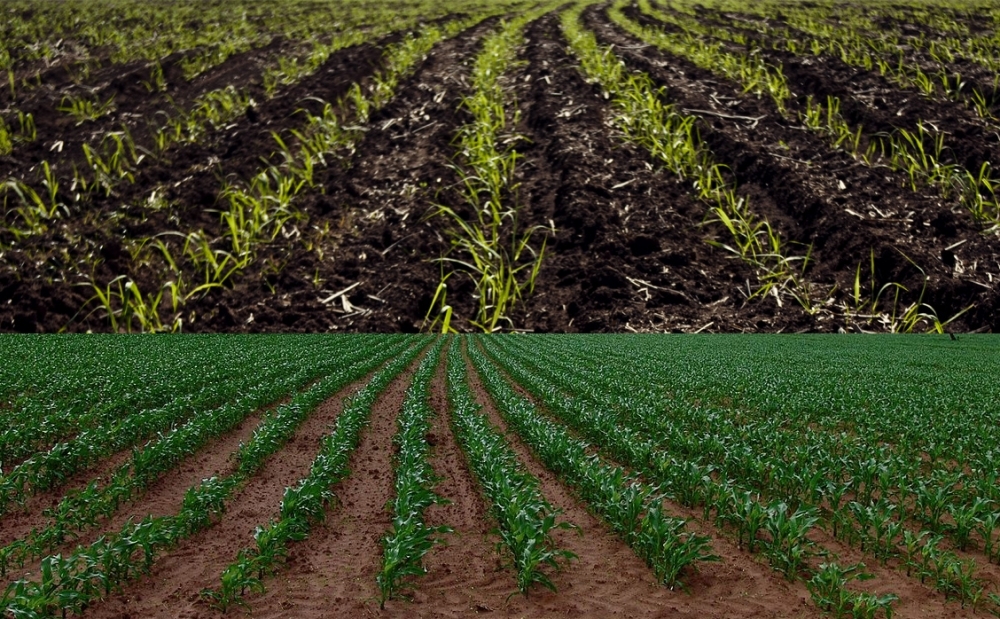

Report concludes that more than enough land is available worldwide for bioenergy and food production, highlighting science-based recommendations to bolster the bioeconomy (photo: Léo Ramos/ Pesquisa FAPESP magazine & Wikimedia Commons)
Report concludes that more than enough land is available worldwide for bioenergy and food production, highlighting science-based recommendations to bolster the bioeconomy.
Report concludes that more than enough land is available worldwide for bioenergy and food production, highlighting science-based recommendations to bolster the bioeconomy.

Report concludes that more than enough land is available worldwide for bioenergy and food production, highlighting science-based recommendations to bolster the bioeconomy (photo: Léo Ramos/ Pesquisa FAPESP magazine & Wikimedia Commons)
Agência FAPESP – Biofuel production, food security and sustainable development goals can be achieved simultaneously, according to Reconciling Food Security and Bioenergy: Priorities for Action, a report published on June 14 by a multidisciplinary team of experts from ten research institutions in seven countries.
The report highlights science-based evidence that shows food and bioenergy need not compete for land.
Among the report’s recommendations are the adoption of strategies to address local risk factors; engagement with local stakeholders; encouraging food and bioenergy complementarity; adopting flex crops that can provide food along with other products and services to society; and planning local market diversification to make better use of waste products such as sugarcane straw and bagasse, for example.
“Simplified global models and generalizations hinder an accurate understanding of the costs and benefits of biofuels. It’s essential to work with reliable data, but most of the discussion on food, biofuels and climate isn’t doing that,” said Keith Kline, a researcher affiliated with Oak Ridge National Laboratory (ORNL) and first author of the report, published in the journal GCB Bioenergy.
The study was coordinated by ORNL, the US Department of Energy’s largest science and energy laboratory, with input from FAPESP’s Bioenergy Research Program (BIOEN).
The report also recommends support for implementation of multiple-use production units to increase the supply of sustainable biomass; adaptive management of such units; clear public communication about co-production goals, barriers and opportunities to address local needs; and collaboration with local development programs.
“A significant proportion of a country’s energy can be supplied by biomass at the same time as food production is increased,” said Glaucia Souza, a professor at the University of São Paulo’s Chemistry Institute (IQ-USP), co-author of the report and a member of BIOEN’s steering committee. “In 40 years of monitoring, learning and adaptation, Brazil’s sugarcane ethanol program has shown how more incentives for land restoration and ecosystem services can be reconciled with improvements in food security and poverty reduction.”
The sugarcane-ethanol industry in Brazil supports 4.5 million jobs, improves livelihoods, and promotes rural infrastructure and development, according to the report.
The report notes that agro-ecological zoning developed in response to biofuel sustainability concerns in Brazil has influenced other agricultural sectors and helped protect biodiversity and forests, which are important resources for sustained food production in rural areas.
The development of a sustainable bio-based economy, or bioeconomy, is a fundamental part of national strategies to enhance energy security and reduce greenhouse gas emissions.
The report also notes that investment in research and systems leading to increased food and energy security can mitigate risk factors.
Besides Kline and Souza, the report was produced by researchers affiliated with the Center for Environmental Policy at Imperial College London in the UK; the University of Twente in the Netherlands; Argentina’s Rural Engineering Institute (INTA); the Stockholm Environment Institute Africa Center in Nairobi, Kenya; the Bureau of Energy Efficiency (BEE Energy), an agency of the government of India; and the World Bank in Washington DC, USA.
The report is available at: onlinelibrary.wiley.com/doi/10.1111/gcbb.12366/full.
Republish
The Agency FAPESP licenses news via Creative Commons (CC-BY-NC-ND) so that they can be republished free of charge and in a simple way by other digital or printed vehicles. Agência FAPESP must be credited as the source of the content being republished and the name of the reporter (if any) must be attributed. Using the HMTL button below allows compliance with these rules, detailed in Digital Republishing Policy FAPESP.





